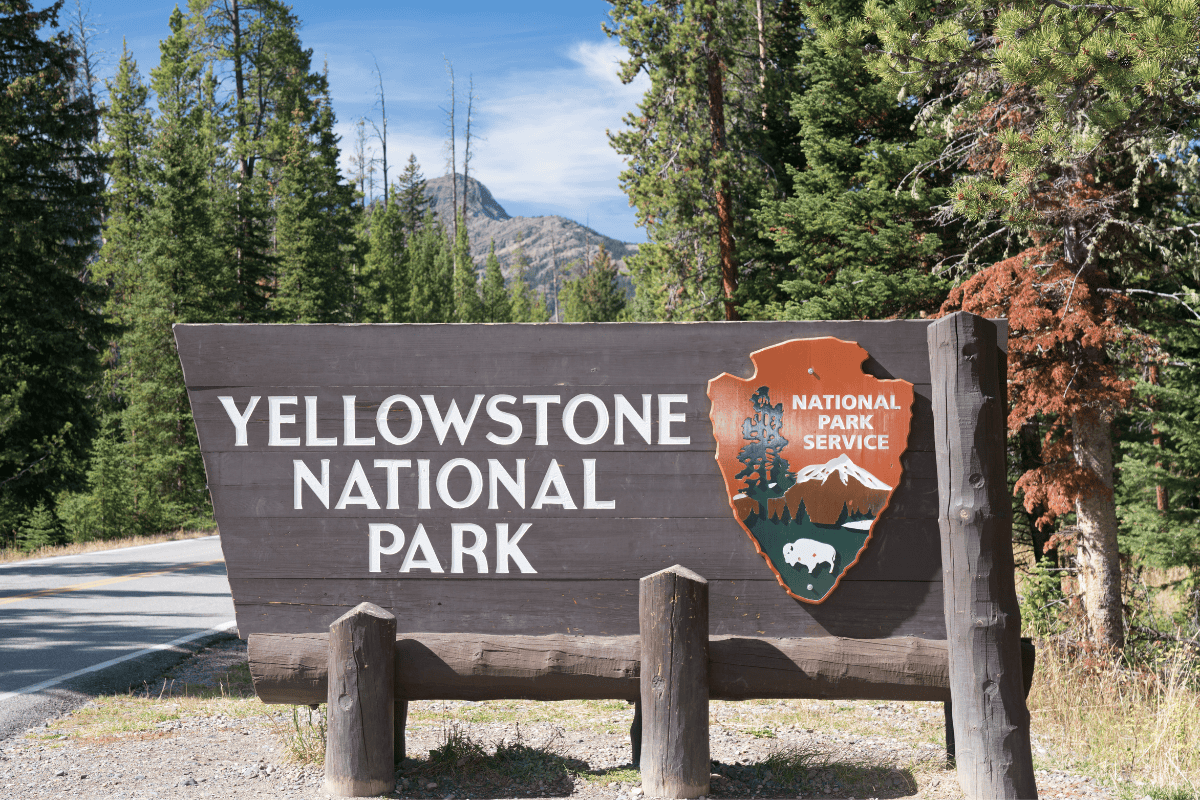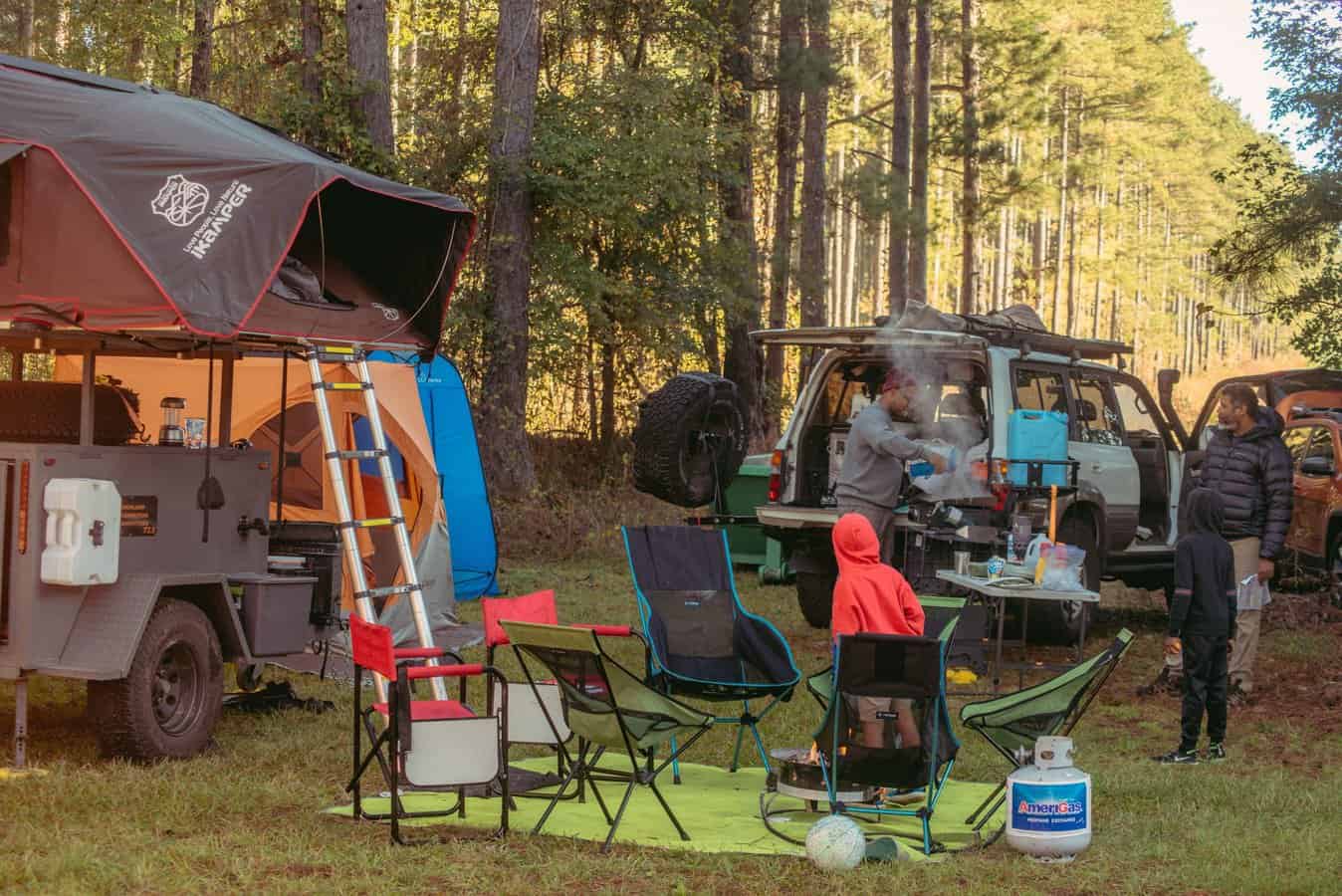Every RVer has an opinion about whether or not RV driving with the refrigerator on is a safe thing to do. Technically it’s totally possible to keep your propane refrigerator running while you’re driving. But should you? Let’s look at the pros and cons.
Considerations About RV Driving with Refrigerator On
There are lots of opinions about running the fridge in a travel trailer on propane while driving. Here is one more. The short answer is Yes, you can tow with the fridge running on propane. However, should you? Leaving the RV refrigerator running has additional propane system risks. Are you willing to accept them?
Keep RV Propane On at Your Own Risk
I have read through several owner’s manuals from different companies about travel trailer and RV refrigerators. I did not come across information describing safety or hazard consideration about RV driving with the refrigerator on. I looked at Dometic, Nova Kool, and several owner’s manuals on the Gulfstream website and did not find any restrictions.
When we purchased our camper 3 years ago there were no warnings on the fridge telling us to turn it off while towing. However, if you’re like me a little light bulb goes off. You say to yourself I am driving with an open flame behind me. There must be some risks to this situation and what should I do to avoid these risks of driving with the RV refrigerator running?
The propane supplier Amerigas has recommendations. They suggest turning off all gas appliances and the valve at the tank whenever the vehicle is in motion.
RV Refrigerators Work Best When Level
RV refrigerators are absorption refrigerators. They work differently than the compressor fridge in your home. RV refrigerators run on propane. They have no moving parts. This makes them very reliable.
Absorption refrigerators use heat and chemistry to keep your food cold. RV refrigerators work when propane heats up an ammonia solution until it boils. The ammonia vapor then rises to the condenser where it becomes a liquid. The liquid ammonia is then combined with hydrogen gas in the evaporator and becomes a gas again. This rapid evaporation cools the refrigerator.
The hydrogen and ammonia gas then enter an absorber coil. Then the hydrogen gas returns to the evaporator. The liquid ammonia returns to the holding tank. Then it recombines with the other chemicals and starts the process over.
The RV refrigerator absorption cycle requires that the camper is level for the fridge to work its best. If the camper is NOT level two things can happen.
- First the flame does not contact the boiler as directly, causing the ammonia solution to not boil as much.
- The second is the system requires gravity to work. While the camper is not level the liquids will flow slower, causing backups in the cycle.
When you keep the RV refrigerator on while driving, you go up and down hills and around corners. At those times, your fridge has to work harder to keep things cold.
Risks of Running RV Refrigerators While Driving
The risks of running RV refrigerators while driving include fire and explosion. This risk is mostly if something were to go wrong, and we have all seen things go wrong while traveling.
If you get into an accident or if a tire blows out, the gas lines that run under the camper could rupture and leak. The propane could get trapped in a storage compartment or a cavity under the trailer.
It only takes ignition source to start a fire or cause an explosion. This could happen during the accident or just after. If you hit something like truck tire retread, it could possibly hit the gas line. You may not even notice that your propane is leaking until your RV is in flames.
If you Keep the RV Fridge on while Driving
If you choose to leave the RV refrigerator on while driving, it is required by law that you turn off all gas appliances before entering a gas station. You must do it before you even pull up to the pump. So, before you even get to the gas station you must find a safe place to pull over and turn off RV propane at the source.
Once you leave the gas station you must find another safe place to pull over to turn the propane back on. Too much risk and hassle if you ask me. Many highway tunnels and ferries also require RVers to turn off propane.
What Happened when I left the Refrigerator On
When I let the refrigerator run while towing, it worked out very well. Everything was cold including the ice cream when we got to camp. I have also had it do very poorly and everything got warm and melted.
I think the overall risk of fire and explosion is low even if there is an accident. After all some cars run on propane right?
- I am more concerned that the fridge won’t keep my food cold enough.
- Stopping to turn off the refrigerator before pulling into a gas station is a total hassle.
User error is also a possibility. For example, on one trip I was in hurry to leave, unplugged the camper from the house, and hit the road. I didn’t confirm the fridge switched over to propane. It never started because there was air in the line. The fridge tried three times to start and then turned on the check light. Three hours later on a 100-degree day, everything in fridge was warm.
How to Keep RV Refrigerator Food Cold When You Drive
I weighed all the risks of leaving the RV refrigerator on while driving. Instead, I choose to set up our refrigerator like a cooler while we are on the road.
Meal Planning
Before you leave you are all excited about what you are going to do when you get to the campsite and many over prepare for the food that they are bringing. Then when it’s time to leave you have a bunch of food to bring home. The key to successful food transportation is to plan your meals ahead of time so that your leftovers that need to be kept cold can be kept to a minimum. The less food you have to spoil at the end of trip the better.
Freeze anything that can be frozen
If it can be frozen and then allowed to thaw in the fridge, freeze it. This allows the refrigerator to act like a cooler that we filled with ice. Freeze all your meat or make Foil wrapped meals or potatoes that can be frozen and then places on the grill or camp fire to cook. To avoid having to wait for something to thaw out on the first night of camping we bring fried chicken from the deli counter, it can be eaten cold picnic style or heated up the microwave, if you have one.
Burgers and hotdogs can be frozen and then put on the grill frozen or partly thawed. For brats, boil them in beer and freeze so all you have to do at the campsite is heat them up and char the outside. We also will freeze the kids’ juice boxes, and throw in bottles of frozen water.
Get it as cold as possible
Turn the fridge on two or three days before your trip and set it to its coldest setting.
Pack your frozen and non-frozen food items in tight and surround them with frozen water bottles or ice packs. If you are traveling a distance and want the fridge to be extra cold without turning it on, use salt water in the frozen bottles. Salt water freezes at a lower temperature and will work better at keeping things cold than plain drinking water. I prefer to have more ice-cold drinking water, so that is what I use.
Add ice and don’t open the refrigerator. If you don’t open the fridge it will stay colder longer, just like in a power outage. This should give you several hours of driving without having to use propane to power the fridge. Instead, pack some drinks and snacks in a cooler. That way you can access them while you’re driving.
Once you arrive at the campground turn on the fridge and remove some of the frozen water bottles and all of the ice packs from the fridge. Then put as many as you can into the freezer for the ride home. This allows the air to circulate in the fridge.
If you leave the RV fridge on while driving
Make sure it turns on before you pull out of the driveway. You still want to freeze things that can be frozen. Add some ice packs or frozen water bottles for a little insurance. Don’t pack it as tight. Air needs to move around to keep things cold.
Whether you run the fridge or not take the proper precautions to keep food cold and safe. If the fridge is on remember to turn it off when required to stay safe.




I never thought about pulling into a gas station to get gas while my frig was running on propane. My fill tank on my car is on the same side of the camper where the refrigerator is located, just 12 feet or so away. Thanks for the reminder. Using the frig as a cooler from now on.
It’s all about peace of mind. Do you lock your doors at night?
Back in the 90s, at what was then a Petro gas station in Wythe County, VA, a man was killed due to either the fridge or hot water heater running on propane on a towed travel trailer. It was not a normal set of circumstances but it did happen. A worker was serving a gasoline pump, and had some cones blocking off just the pump he was working on. Apparently whatever work he was doing involved open fuel / fumes from the fuel pump. A travel trailer was pulled in to a nearby pump, and it was close enough to ignite the fuel from the pump being worked on. The worker was severely burned and died days later from the injuries.
I believe that, officially, he was determined at fault because he didn’t block access to all the pumps or as many pumps around where he was working as he should have.
I tried searching for it but it was before our local newspaper put their articles online. If I can find the article I’ll post another comment with it.
A very nice article. Thank you.
If the trailer is stopped then it should be as level as possible for the refrigerator to work well. The process depends on NC (natural circulation), as described in the article. When you are towing it, the process no longer depends on NC to keep the refrigerant flowing due to the bumping and rocking of the trailer. This is why it keeps working even when NC is not happening. The author is right that manufacturers don’t tell you to turn it off while moving because the refrigerator is DESIGNED to work fine while you are moving. But their lawyers won’t let them tell you that because if you manage to have an issue they don’t want you showing up in court with their owner’s manual. Leave the thing on, that’s what it’s for!
Also, WRT trying to run it on vehicle electrical power while moving, before trying this you have to make sure that your refrigerator is THREE-WAY powered, AKA Tri-Power. Some (most?) are gas/shorepower (120VAC) and won’t refrigerate on 12VDC (although they use 12 VDC for the electrical control power). I have experienced this while running out of propane while towing (it is a 2017 Dometic). Check light comes on, refrigerator stops cooling, and never lost 12VDC.
AMEN BROTHER! Thank you for your commonsense reply!
I use a 12 volt 30 amp 300 watt inverter to run my 120 volt 300 watt/gas fridge on the road. I send power to my trailer via anderson connectors and #6 AWG wire from my alternator with a golf cart solenoid switching it on from the ignition to prevent killing my truck battery. I use soft welders cable for the anderson connectors going to the trailers battery.
If you have an onboard generator run it it power the fridge and air conditioning during hot weather.
For what it’s worth, I agree. Use 12VDC power for the fridge while driving or turn it off. Much safer and gives me better piece of mind.